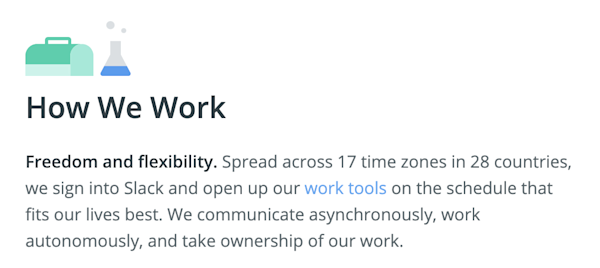5 Tech Companies Who Switched to Remote Work Because of COVID-19
September 9, 2020

2020 has been a transformative year in terms of how companies approach team distribution. In the last six months, we’ve seen companies of all sizes adapt to this new normal, scraping traditional work practices for a more forward-thinking and borderless approach.
The Future of Work is Remote
2020 has been a transformative year in terms of how companies approach team distribution. For many, COVID-19 unexpectedly forced businesses to transition to remote workplaces, leaving companies scrambling to implement work-from-home solutions. In the last six months, we’ve seen companies of all sizes adapt to this new normal, scraping traditional work practices for a more forward-thinking and borderless approach.
While most are temporarily working from home until 2021, several top tech companies have taken it a step further, announcing they plan to let most of their staff work from home permanently, post-pandemic. As companies continue to follow suit, working remotely could very much be the future of work. You can say hello to a larger, more diverse talent pool with broadening experiences, giving businesses a leg-up over the local-only competition.
Here are five companies paving the way, building innovative businesses with remote-friendly workplaces while distancing themselves from the traditional way of corporate confinement.
Shopify
Starting with one of the most forward-thinking and disruptive technology companies is Shopify, an eCommerce platform for small businesses. “As of today, Shopify is a digital by default company. We will keep our offices closed until 2021 so that we can rework them for this new reality. And after that, most will permanently work remotely,” CEO Tobi Lutke tweeted in May.

Tobi also expressed a great viewpoint on company culture, stating that just because you have a good one, doesn’t mean you can hold on to it permanently. A company's culture should evolve with the current landscape and trends—and the current landscape is socially distanced.
“Office centricity is over.”
— Tobi Lutke, CEO of Shopify
According to the State of Remote Work report, 40% of respondents say that a flexible schedule is the biggest perk to working remotely. Shopify is a best-in-class example of a company that listens to its employees and acknowledges what they want, which is the ability to control their own schedule and environment.
Twitter (and Square)
CEO of both Twitter and Square, Jack Dorsey told his employees that they could work from home “forever” if they choose to do so.
“We want employees to be able to work where they feel most creative and productive,” a company spokesperson said. “Moving forward, Squares will be able to work from home permanently, even once offices begin to reopen. Over the past several weeks, we’ve learned a lot about what it takes for people to effectively perform roles outside of an office, and we will continue to learn as we go.
Working remotely, however, is not a solution for everyone which is why Twitter and Square’s offices will reopen when it’s safe to do so.
Slack
If it makes sense for any company to transition to remote-first, it's Slack. After all, they created the top team collaboration tool that helps remote teams stay productive no matter where they're working from.
In August, they announced they wouldn't be opening their offices until June 2021. In a recent Fast Company article, Slack's SVP of People said, "Our hiring policies have changed dramatically and permanently. For example, we're now opening new roles to remote candidates, and we're giving most employees the option to work remotely on a permanent basis."
It's clear that Slack is committed to shaping the future of distributed work, clearly outlined on their careers page showing how much they value their employees' choice in where they do their work. They recently completed a successful Twitter campaign, #WhenRemoteWorks committing up to $200,000 in support of Year Up, an organization that helps propel young adults into fulfilling professional careers. Hundreds of Slack users around the globe tweet their remote work stories, and in return, Slack donated $5 per tweet. It’s clear that Slack not only talks the talk, but is walking the walk by not only promoting a work from home shift internally but externally as well.

Hubspot
Hubspot, a marketing, sales and service software platform believes that results matter more than when or where they’re produced. A self-proclaimed hybrid remote-office company, Hubspot has distributed teams around the world.
Their passion for creating the best employee experience is outlined on their careers page dedicated to highlighting their remote-friendly hiring practices. Hubspot also has a dedicated role, Remote Work and Inclusion Manager who is in charge of the rollout of a global philosophy around remote work that includes high-level company-wide guidelines.

Remote work has always been a focus at Hubspot and embedded into their culture prior to COVID-19. In 2018, the company’s remote population grew by approximately 117%. Earlier this year, pre-pandemic, the entire company even participated in Remote Week, with three goals in mind; work more effectively as a highly distributed team, cultivate empathy for full-time remote workers and improve communication with remote workers.
Zapier
This one may or may not count, because Zapier has been fully remote since day one, and currently, all 200 employees work remotely from different locations, they don’t have any office buildings.
As one of the most successful examples of a completely distributed team, they’ve taken a thought-leadership stance by educating other organizations launching content pieces like The Ultimate Guide to Remote Work with the goal of sharing best practices.

Their remote-only culture is embedded throughout their career page highlighting their remote-friendly operations. “Work from anywhere” is number one on their Benefits and Perks list. Wade Foster, CEO of Zapier wrote a great article on why it works, that you can check out here.
Final thoughts
In conclusion, the coronavirus pandemic has helped validate tech companies can work from home without affecting the bottom line. While many businesses were primed in advance, it’s up to the company and its people to decide if remote-first is what’s best heading into the future. Whether companies choose to go back full-time or not, it’s clear that the pandemic has permanently changed the way we view remote work for the better. Remote work has its own challenges, but with the right tools and systems in place, it’s possible to build a scalable, well connected and distributed team from wherever there’s wifi.
Work From Home Gift Boxes Delivered Straight to Your Employees Doorstep
Get Started
Start building your recognition culture with us today.
Ready to make a difference in your employees’ lives and watch your company culture thrive? Contact us to speak with a member of our passionate team.

